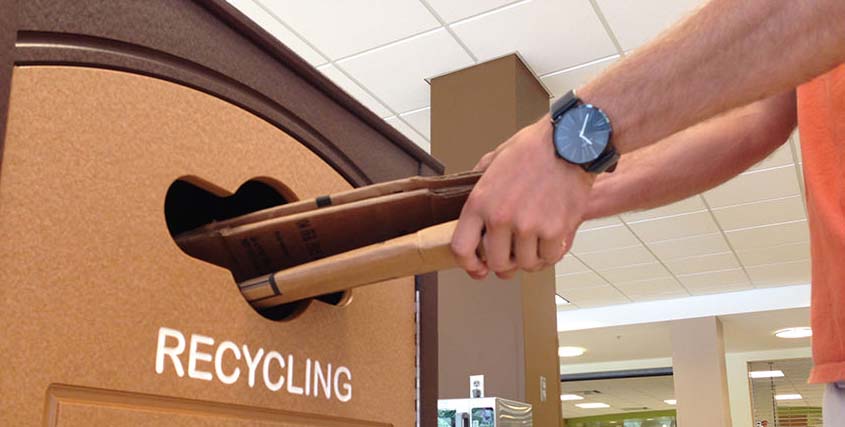Every fall thousands of students migrate from home to campus, leaving in their wake millions of boxes and packing containers. This year, at Bowling Green State University, residents of one campus learning community introduced newcomers to Recycling 101 when they volunteered to assist with Move In Day. In addition to hauling boxes out of vans and into dorm rooms, they also saw to it that those boxes—and other items—were recycled. With help from the Sustainability Center, the service project was a major success, collecting 25 tons of recyclables including 15 tons of cardboard and 10 tons of bottles and cans.
This project epitomizes the good that can come from an integrated effort built on intentional imagination. The University saved the cost of hauling and landfilling 25 tons of trash; the Sustainability Center earned income from the recyclables. The student volunteers had the satisfaction of doing something to make their campus more sustainable, and thousands of incoming students were introduced to the idea that recycling was a way of life in their new environment.
Campus recycling projects are springing up at colleges and universities all over the country. Many educational institutions are pursuing Zero Waste as a goal, and students and staff have come up with creative ideas about how to make that happen.
- University of Michigan students can recycle pencils, markers and other writing instruments thanks to a partnership with TerraCycle, an innovative company that recycles many items that aren’t part of traditional recycling programs.
- Campuses that participate in the Gameday Recycling Challenge win Wall of Fame honors if they divert 90% of their game day waste to recycling.
- The SWAP program at the University of Wisconsin conducts online auctions to find buyers for surplus equipment and furniture so those items don’t end up in the landfill
- Plastic bottle waste is minimized on 73 campuses where students participate in Take Back the Tap, a project that provides refillable bottles and filling stations on campus.
- At Repair Fairs at Oregon State University, volunteers teach students to repair items that might be discarded including clothing, appliances and other household items.
- Recyclemania encourages students to participate in friendly competition in a variety of recycling projects. Last year, North Lake College took the waste minimization prize by generating less than four pounds of trash per person and Richland College took Grand Champion by recycling 82% of the waste generated on campus.
Campus recycling projects like these encourage young people to develop habits that will serve them well throughout their lives. Many conflicts arise because resources seem scarce. If it seems that there isn’t enough to go around, people will defend what they have.
Cooperative Wisdom encourages us to explore other alternatives. We can provide more of what’s needed if we think about resources differently. What can be conserved? What can be reused or recycled? When students expand their capacity for intentional imagination and become collectors of recyclables, they begin to value themselves as contributors to sustainable communities.


Leave a Reply